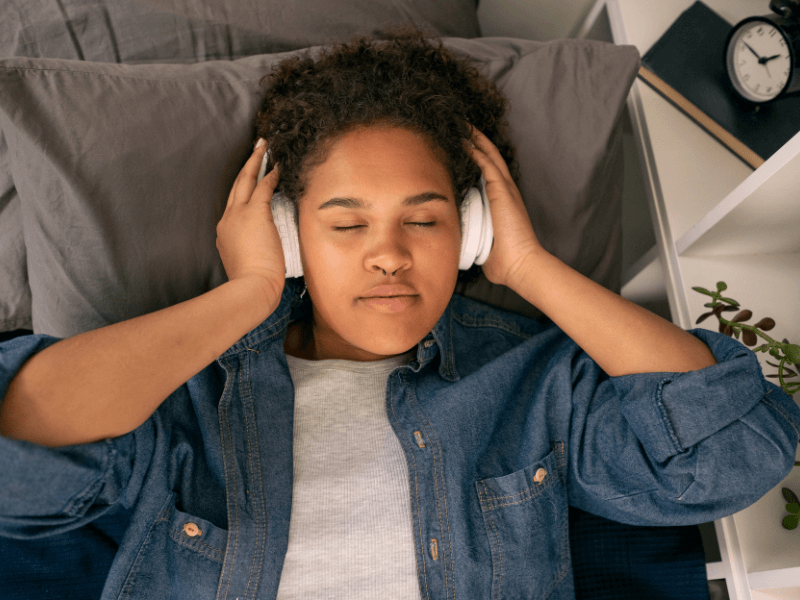


Do you find it hard to fall asleep at night? You close your eyes, hoping that you’ll fall asleep eventually but it doesn’t happen. This is a problem many face; sometimes, all you need is a helping hand. Listening to sleep sounds can help you fall asleep at night but you might wonder what is the best music for sleep?
Many different kinds of music can help with sleep and it all comes down to personal preferences. In this article, I’ll take you through some of the best sleep music so keep reading on!

Sleep plays a huge role in maintaining good physical and mental well-being. We need sleep in order for our body to carry out its basic functions such as retaining information from the day and repairing and healing tissues in our body.
Listening to music has always been a popular sleep aid to help many people improve their sleep quality [1].
Some benefits of listening to music for sleep include:
There isn’t only one type of music that helps people to fall asleep. The perfect sleep soundtrack differs for everyone. Some people may enjoy listening to the sounds of the ocean waves crashing, some may prefer the gentle rhythms of birds chirping while others may prefer the classic instrumental music.
With that said, here are some of the more common types of music people listen to for sleeping.
White noise has become a popular choice for many in terms of helping them to relax, fall asleep faster, or focus on a task. It is a combination of all the different sound frequencies that are audible to the human ear.
It typically sounds like a static or hissing noise with a “shh” sound. Some common examples are the sounds of ocean waves crashing, the gentle rain, or a whirring fan, which can also be seen in the videos below.
Ambient sounds are characterized by the tone and atmosphere over traditional rhythms or tunes that are found in classical music or regular pop music [4]. It evokes a sense of calmness and relaxation with its atmospheric or visual quality.
One of the things about ambient music is that it includes natural soundscapes. Think of a constant background noise that fills the space. That is what makes up the ambiance in a place.
Here is an example of an ambient sound:
It is pretty much in its name. Nature sounds are sounds that come from the natural environment that surrounds us. Nature or ‘green’ environments have been linked to relaxation and good well-being for a long time and reduce our body’s fight-or-flight instincts [5].
Nature sounds can sound like the forest, birds chirping, or a flowing water stream.
Listen to this ‘nature sounds for sleep’ audio below.
Meditation music is a type of music that is used to aid the practice of meditation. The calm and soothing tone of the music helps to create an imaginary landscape that allows deep relaxation and mental clarity.
You’ll find that meditation music often utilizes slow and repetitive rhythms with some instruments or natural sounds. This gentle flow quietens the mind and heightens the senses so that you can find inner peace much more easily. It is thought to help improve overall well-being and boost mindfulness [6].
An example of meditation music here:
Beethoven, Mozart and Tchaikovsky. These are some of the most famous music composers, commonly associated with classical music. Classical music is defined as a type of music that was born from Western civilizations.
This type of music uses orchestral instruments such as the piano, violin, cello, and others to create a symphony of sounds. Each piece tends to evoke a sense of emotions or is used to tell a story. The slow pace and lack of lyrics is effective in slowing down your thoughts and heart rate so that you can fall asleep better [7].
Listen to an example of classical music below.

Creating the perfect sleep playlist is about selecting music genres or soothing melodies that you know will help you relax and drift off to sleep. Consider the following tips and tricks to create the ultimate sleep playlist:
Remember to take into account your personal preferences and experiment with different genres and styles to discover what works best for you.
Alternatively, if you find that creating your playlist is too troublesome, many streaming services such as Apple Music or Spotify, offer curated playlists that you can choose from.
The best music for sleep is highly dependent on your personal preference. However, the consensus is that music can help you to fall asleep faster and achieve a better night’s rest. You can either create your own soothing sleep playlist with songs of slower tempos and gentle melodies or use an app or streaming service for a curated playlist.
ShutEye® app is one where you can find variety of sleep sounds and music for sleeping. It allows you to create your own playlist or customize the sounds to help you fall asleep gently and easily.
Ambient Mixer (n.d.) The principles of meditation music [online]. Available at: https://blog.ambient-mixer.com/principles-meditation-music/
Cordi, M. J., Ackermann, S., & Rasch, B. (2019). Effects of Relaxing Music on Healthy Sleep. Scientific reports, 9(1), 9079. Available at: https://doi.org/10.1038/s41598-019-45608-y
Eugenia Hernández-Ruiz, Effect of Music Therapy on the Anxiety Levels and Sleep Patterns of Abused Women in Shelters, Journal of Music Therapy, Volume 42, Issue 2, Summer 2005, Pages 140–158. Available at: https://doi.org/10.1093/jmt/42.2.140
Masterclass (2021) Ambient Music Guide: 5 Characteristics of Ambient Music [online]. Available at: https://www.masterclass.com/articles/ambient-music-guide
University of Sussex (2017) It's true: The sound of nature helps us relax [online]. Available at: https://www.sciencedaily.com/releases/2017/03/170330132354.htm
Su, P., Lai, L., Chang, T., Yiin, M., Perng, J., & Chen, W. (2013). A randomized controlled trial of the effects of listening to non-commercial music on quality of nocturnal sleep and relaxation indices in patients in medical intensive care unit. Journal of Advanced Nursing, 69(6), 1377-1389. Available at: https://doi.org/10.1111/j.1365-2648.2012.06130.x
Vialma Classical (n.d.) The benefits of classical music for sleep [online]. Available at: https://www.vialma.com/en/articles/405/the-benefits-of-classical-music-for-sleep